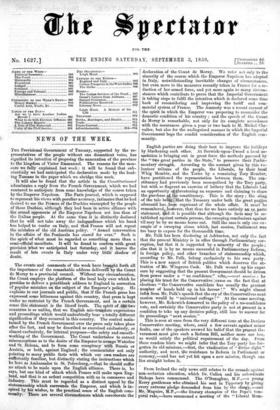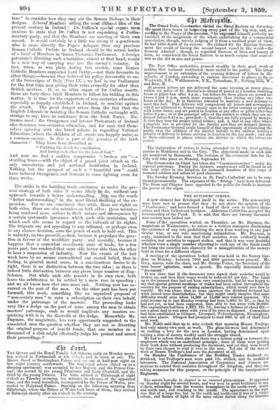From Ireland the only news still relates to the crusade
against non-sectarian education, which Dr. Cullen and his subordinate Bishops have commenced. The Otonoghtte, M.P.,—a young Kerry gentleman who obtained his seat in Tipperary by giving every extreme pledge demanded from him by the clergy,—and Mr. Maguire, M.P.,—the literary champion of the Pope's tem- poral rule,—have summoned a meeting of the " Liberal Mem- hers " to consider how they may aid the Roman Bishops in their designs. Liberal Members aiding the moat illiberal idea of the present century in Ireland' Dr. Callen's special organs seem anxious to state that Dr. Cullen is not organizing a Parlia- mentary party, and that the Members are meeting of their own accord. It would certainly be a little too strong if a gentleman who is more directly the Pope's delegate than any previous Roman Catholic Prelate in Ireland should be the actual leader of a band of Members in Queen Victoria's Parliament. A foreign potentate's directing such a battalion, almost at first hand, would be a new way of carrying war into the enemy's country. In fact, when, as was plain during last session, some Roman Catholic Members supported Lord Derby,—not their favourite in other things,—because they believed his policy favourable to one of the Sovereigns of Italy (Pius LX.), we had in our Parliament for the first time men giving their votes avowedly for other than British motives. If, as an ultra organ of Dr. Cullen asserts, there are forty-three Irish Members to follow his bidding in this matter, it is time for the supporters of non-sectarian education, especially as happily established in Ireland, to combine against the attack. The great danger arises from the fact that the English Liberals in resisting the Roman Catholic onslaught will, strange to say, have no assistance from the Irish Tories. Ex- tremes meet ; the Orangemen and intense Protestants of Ireland also denounce non-sectarian education, and for once find them- selves agreeing with the hated priests in regarding National Education (where the children of all creeds can happily unite) as a common enemy. Is this a part of the paradox of the Irish character ? They have been described as
" Fighting like devils for conciliation, And hating each other for the love of God."
And now we find a sudden compromise " broken out "—a startling truce—with the object of a grand joint attack on the only unsectarian and yet national institution in Ireland. Nothing but the prospect of such a " beautiful row " could have induced Orangemen and Romans to cease fighting even for three weeks.



























